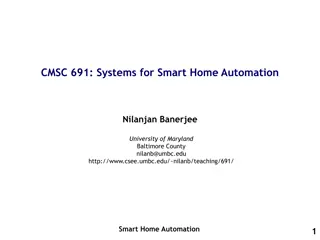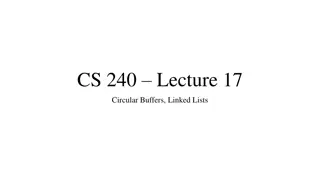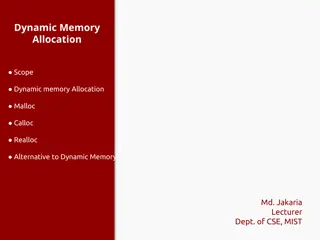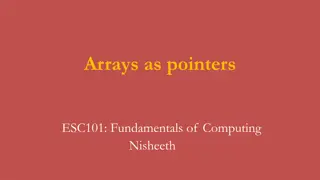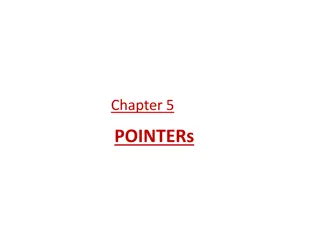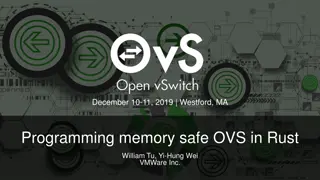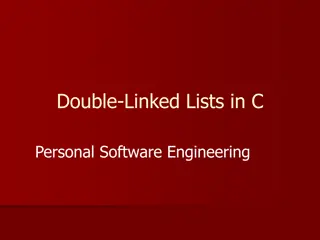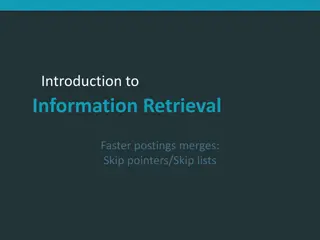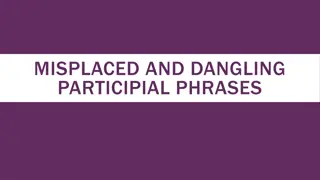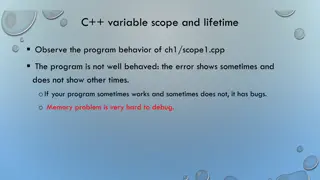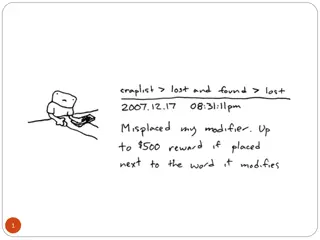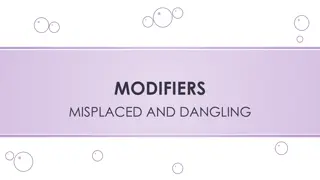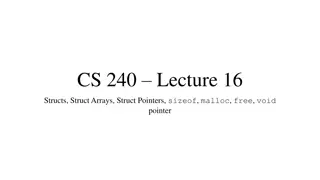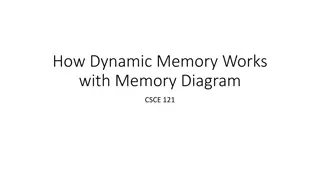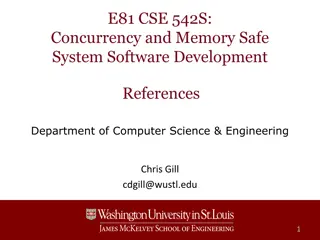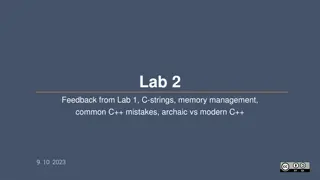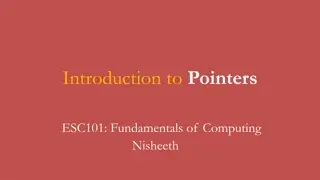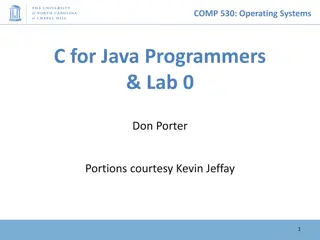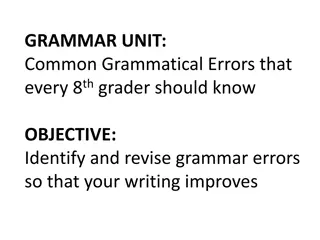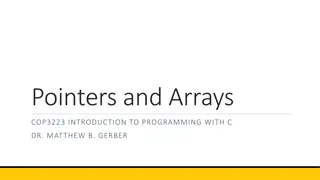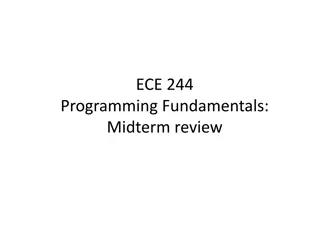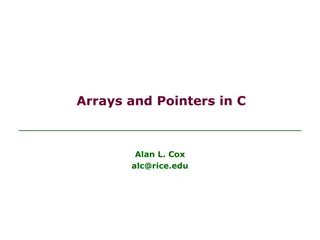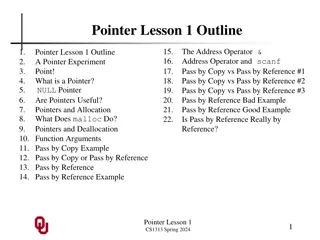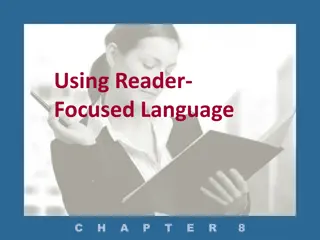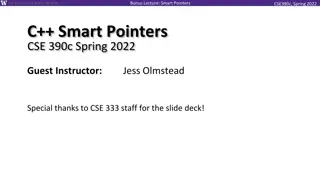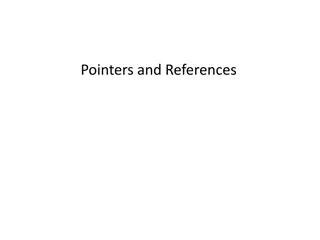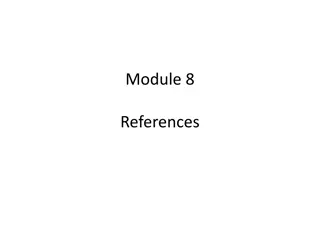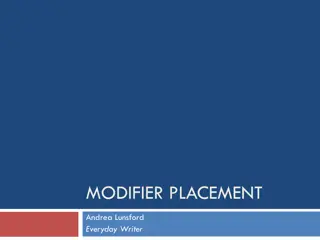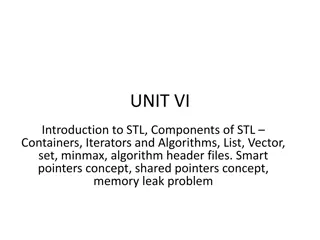Dangling Tuples
Learn about dangling tuples in DBMS, which are tuples that do not participate in a natural join, potentially indicating consistency issues in the database. Referential integrity constraints play a key role in identifying and addressing dangling tuples.
1 views • 58 slides
Comprehensive Guide to Programming in IDL with Pointers and Extensions
Explore the world of programming in IDL with a focus on dynamic variables, heap and pointers, scientific data formats, GUI development, and IDL extensions. Learn about working with pointers, handling dynamic memory, dealing with external software, and examples of code implementation. Discover how to
1 views • 28 slides
Understanding Modern C++ Memory Management and Smart Pointers in Programming Labs
Explore the nuances of memory management in Modern C++ through labs that delve into smart pointers, ownership concepts, and detecting memory leaks using tools like Valgrind. Learn about the importance of using smart pointers to mitigate memory leaks and improve code reliability. Discover the pitfall
9 views • 40 slides
Comprehensive C++ Programming Certification Course Overview
Dive into the world of C++ programming with this certification course! Enhance your knowledge of C++ language features, object-oriented programming, problem-solving techniques, and more. Explore topics like arrays, loops, inheritance, polymorphism, and error handling. With 40 hours of content coveri
2 views • 9 slides
Understanding Pointers and Functions in C++ Lecture
Exploring the concept of pointers and functions in C++, this lecture covers the basics of functions, passing arrays to functions, and understanding how pointers can be used in functions to manipulate data. Attendees will learn about passing entire arrays and returning multiple values using pointers.
10 views • 45 slides
Understanding Delegates and Event Handling in Smart Home Automation Systems
Exploring the concepts of delegates and event handling in the context of smart home automation systems. Delegates serve as object-oriented function pointers, while event handling allows independent components to communicate effectively. Delegates can hold and invoke multiple methods, enabling effici
0 views • 42 slides
Understanding Circular Buffers and Linked Lists in Data Structures
Circular Buffers are data structures designed to efficiently manage streams of data while maintaining a fixed amount of memory usage. The buffer consists of a fixed-length array with head and tail indexes, allowing data to loop back to the beginning when the end of the buffer is reached. It is cruci
0 views • 24 slides
Understanding Dynamic Memory Allocation and Variable Scope in Programming
This content delves into the concepts of dynamic memory allocation, variable scope, and the lifetime of local variables in programming. It explores the scopes of variables in different contexts and addresses issues like dangling pointers and out-of-scope references. The images provided visually enha
0 views • 40 slides
Arrays as Pointers: Fundamentals of Computing
Explore the concept of using arrays as pointers in the context of computing. Learn how to create array of char pointers to store multiple strings, access elements in arrays of pointers, and understand the rules for accessing individual elements. Discover the nuances of pointer manipulation and array
1 views • 10 slides
Understanding Pointers in Programming
Pointers in programming are variables that store the memory address of another variable, offering benefits such as efficient data handling and reduced program complexity. By declaring and initializing pointers correctly, variables can be accessed and manipulated directly, as demonstrated through exa
2 views • 19 slides
Understanding and Correcting Modifiers in Writing
Learn about modifiers, including dangling, misplaced, and squinting modifiers, with examples and tips on how to revise sentences to avoid these errors. Improve your writing by understanding how modifiers impact sentence clarity and meaning.
0 views • 10 slides
Programming memory safe OVS in Rust
Explore the benefits of Rust programming language in providing memory safety while eliminating common memory issues like uninitialized variables, dangling pointers, and memory leakages. Rust's ownership model and borrowing system allow for secure memory management, ensuring high performance and elim
0 views • 18 slides
Understanding Doubly Linked Lists in C Programming
A doubly linked list in C comprises nodes with pointers to the next and previous nodes. Managing two sets of pointers can be complex, but adds flexibility for adding and removing nodes dynamically. This post explores the structure, implementation, and examples of doubly linked lists in C.
0 views • 13 slides
Faster Postings Merges with Skip Pointers in Information Retrieval
Enhance the speed of postings merges in information retrieval by utilizing skip pointers and skip lists strategically. Learn how to augment postings with skip pointers, optimize query processing with skips, decide where to place skips, and adopt simple heuristics for skip pointer placement.
0 views • 7 slides
Understanding Participial Phrases: Usage and Examples
Learn about participial phrases, their correct usage, and examples of both correct and incorrect placements. Explore how participial phrases modify nouns in sentences and how to identify and correct misplaced or dangling participial phrases.
1 views • 11 slides
Understanding C++ Variable Scope and Lifetime
The program behavior in C++ can be affected by variable scope and lifetime. This includes global variables accessible throughout the program's execution, local variables limited to function execution, variables declared within blocks, and pointers managing memory allocation. Issues such as memory pr
0 views • 5 slides
Understanding Modifiers in Grammar
Explore the world of modifiers in grammar through this informative content. Learn about different types of modifiers, examples of misplaced and dangling modifiers, and how to correct common grammatical errors. Enhance your understanding of how modifiers can enhance or change the meaning of a sentenc
0 views • 14 slides
Understanding Modifiers: Misplaced, Dangling, and Adverb Placement
Learn about the concepts of misplaced modifiers, dangling modifiers, and adverb placement through clear examples and explanations. Practice fixing sentences with modifier errors and enhance your writing skills. Access additional practice resources to strengthen your understanding and application of
0 views • 7 slides
Understanding C Structs and Pointers for Data Organization
In C programming, structs allow the grouping of related data values together to create user-defined data types. This enables better organization and manipulation of data within a program. Structs can be initialized, assigned values, and accessed using pointers for efficient data handling.
0 views • 20 slides
Mastering Dangling Modifiers in Writing
Dangling modifiers occur when the noun or idea being modified is missing from the sentence. This leads to confusion or unintended meanings. Learn how to identify and correct dangling modifiers with examples and revisions. Improve your writing clarity and precision by mastering this common grammar is
0 views • 4 slides
Understanding Dynamic Memory Allocation in C++ with Memory Diagrams
Explore the concept of dynamic memory allocation in C++ through detailed memory diagrams and code examples. Learn about heap, stack, pointers, object creation, memory management, and potential pitfalls like dangling pointers. Dive into the fundamentals of memory handling in programming.
0 views • 10 slides
Rust References and Memory Safety in System Software Development
In Rust programming, references play a crucial role in ensuring memory safety and concurrency. Understanding concepts like owning pointers, shared vs. mutable access, working with references, and reference handling is vital for developing robust and secure system software in Rust. The language enfor
0 views • 9 slides
Modern C++ Programming Best Practices and Pitfalls: A Comprehensive Overview
Explore the intricacies of modern C++ programming including C-strings, memory management, smart pointers vs. raw pointers, and common mistakes to avoid. Understand the differences between stack and heap allocation, comparing C-strings with std
0 views • 34 slides
Understanding Pointers in Computing
Exploring the concept of pointers in computing, this content delves into the fundamentals of storing memory addresses, the size of variable types, managing memory, and utilizing pointers effectively. It discusses how pointers are used to store memory addresses and provides examples of pointer usage
0 views • 10 slides
Understanding Operating Systems in C for Java Programmers
This content delves into the intricacies of operating systems using C programming language, aimed at Java programmers. It covers basic syntax, data types, pointers, memory placement, function pointers, and more, providing a comprehensive overview with examples and explanations.
0 views • 23 slides
Grammar Unit: Common Grammatical Errors & Dangling Modifiers
Learn about common grammatical errors such as misplaced modifiers and dangling modifiers in this educational unit designed to help 8th graders identify and revise errors to enhance their writing. Examples and explanations provided guide readers to improve their grammar skills and avoid ambiguity in
0 views • 13 slides
Understanding Pointers and Arrays in C Programming
Variables in C programming have specific memory locations, and each variable occupies memory space. Arrays in C take up memory depending on the number of elements. Pointers are special variables that store memory addresses instead of values directly. They can point to other variables and be used to
0 views • 28 slides
Mastering Dangling Modifiers: Examples, Definitions, and Fixes
Understanding dangling modifiers with examples, a clear definition, and practical fixes to rearrange sentences correctly. Learn how to identify and correct these common grammatical errors for better writing skills.
0 views • 8 slides
Understanding Ambiguity in Writing: Types and Examples
Explore the different types of ambiguity in writing, including lexical, syntactic, and structural ambiguity. Learn how awkward wording, dangling modifiers, and crash blossoms can lead to confusion in writing. Discover ways to identify and address ambiguity in your own writing to improve clarity and
0 views • 15 slides
Programming Fundamentals Midterm Review
The review covers various topics including C parameters passing, compilation, program organization, C++ I/O, the use of stringstream, pointers, structures, classes, access control, constructors/destructor, and operator overloading. It includes code snippets and explanations on parameter passing, pro
0 views • 9 slides
Understanding Arrays and Pointers in C Programming
Explore the fundamentals of arrays, pointers, and strings in C programs, along with their representation at the machine level. Learn the similarities and differences between these data types and how to effectively use them in C programming. Dive into array indexing, representation, sizes, multi-dime
0 views • 26 slides
Understanding Phrases and Participles in English
Learn about different types of phrases, such as prepositional and appositive phrases, their functions in sentences, and how to correctly identify and use them. Practice identifying and correcting misplaced and dangling participles. Includes examples and explanations to enhance understanding of these
0 views • 11 slides
Understanding Pointers in C: A Beginner's Guide
Delve into the world of pointers in C with this comprehensive guide covering topics such as the address operator, pass by copy versus pass by reference, pointer usage, NULL pointers, pointer allocation, and practical experiments to enhance your understanding. Learn about the fundamentals of pointers
0 views • 22 slides
Understanding Pointers and Functions in C Programming
Explore the concepts of pointers, command line arguments, and functions in C programming. Learn how to manipulate values using pointers, handle character conversions, and return pointers from functions. Discover the limitations and best practices when working with pointers in C.
0 views • 26 slides
Enhancing Communication Skills Through Reader-Focused Language
Discover how to effectively use reader-focused language in communication by employing specific and clear language, choosing precise words, avoiding misplaced and dangling modifiers, and considering your readers' culture and language. Learn strategies to ensure your message is conveyed accurately and
0 views • 32 slides
Understanding Smart Pointers in C++ - Bonus Lecture CSE390c Spring 2022
Explore the concept and benefits of smart pointers in C++ as a solution to managing heap-allocated memory more effectively. Learn about avoiding memory leaks and errors when handling pointers through smart pointer implementation. Dive into a Toy Smart Pointer example using a custom class template.
0 views • 36 slides
Memory Management in C++: Pointers, References, and Destructors
Exploring memory management concepts in C++, including pointers, references, allocating and deallocating memory using new and delete, handling arrays, and understanding the role of destructors in managing memory resources effectively.
0 views • 28 slides
Understanding Perl References and Pointers in High-Level Languages
Explore the concept of references in Perl, similar to pointers in languages like C and C++. Learn how references allow you to work with memory addresses and change variable values efficiently. Discover the basics of creating, using, and dereferencing references in Perl programming.
0 views • 24 slides
Understanding Modifier Placement in Writing
The importance of correct modifier placement in writing is highlighted through examples of misplaced, limiting, squinting, disruptive, and dangling modifiers. Learn how to keep modifiers close to the words they modify, avoid disrupting sentence connections, and prevent dangling modifiers that modify
0 views • 8 slides
Understanding STL in C++: Containers, Iterators, Algorithms, and Smart Pointers
STL (Standard Template Library) in C++ encompasses containers like list, vector, set, algorithms utilizing iterators, and smart pointers to handle memory leak issues. Learn how these components work together to manage data efficiently using templates and generic classes.
0 views • 18 slides





